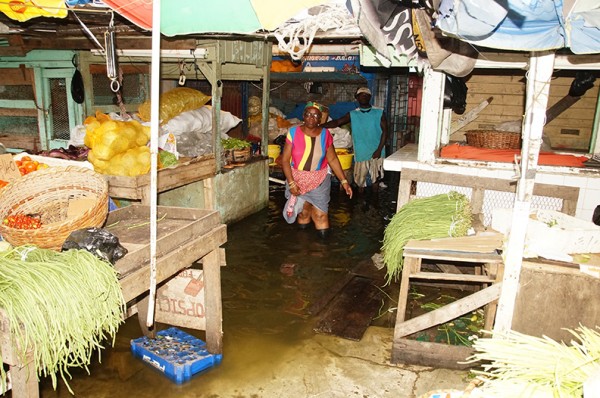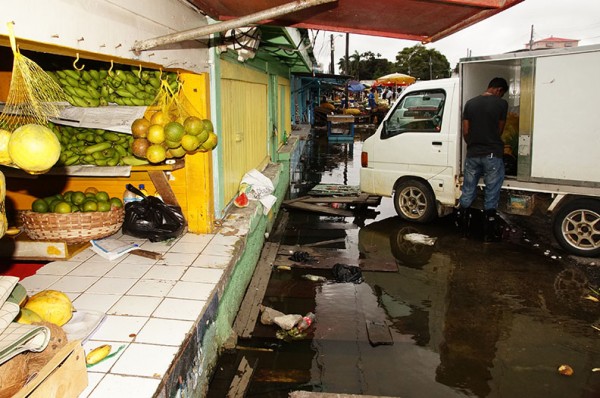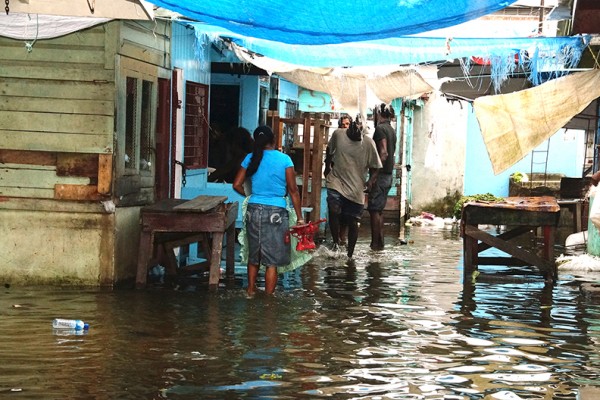Sustained spells of heavy rainfall that lasted the entire weekend and turned Bourda Green into a lake resulted in the suspension of trading for a period lasting until at least Monday and triggered the customary frustration amongst market vendors.
The flooding crisis which has affected other municipal markets has posed what is perhaps an earlier than expected headache for a new government that will now have to place significantly improved drainage for the city high on its list of urgent priorities if its post-elections ‘honeymoon’ is not to be much shorter than it would like.
After the heavy downpours of last Saturday and Sunday, particularly, Stabroek Business visited a Bourda Green that bore a closer resemblance to a lake than a trading space to find stalls shut tight and a handful of traders seeking to salvage what they could of the greens and vegetables inside stalls some of which had actually been reached by the floodwaters.
Loss of trade had become an accustomed routine for these intrepid traders and this time around it has been no different. As early as last Friday in some instances, the rains had brought business to a grinding halt.
What this newspaper witnessed on Monday suggested that even if the vendors were willing to trade no sane buyer would have ventured into the floodwaters on the “green’ to purchase items of food which, in some patently obvious instances, had been contaminated by the floodwaters. While this newspaper was there on Monday some spoilt vegetables were being dumped.
Those vendors with whom Stabroek Business spoke responded to questions with an air of resignation rather than anger. It is clear that they have now ‘written off’ a considerably discredited Georgetown municipality as part of the problem rather than part of the solution and while we were there a vendor who said that he had come from ‘across the river’ was wondering aloud about the feasibility of collective legal action by the vendors who pay a fee to the municipality to trade on the green in a situation where they cannot be guaranteed a safe and secure trading space.
Some of the other vendors were standing around but the man’s enquiry was attracting little interest. On the whole the vendors appeared to have other more pressing concerns not least of which were the loss of trading days and the attendant loss of earnings and the entirely justifiable concern that the visible public health concerns engendered by the flooding was likely to put a brake on patronage for some time after the waters recede.
Loss of faith in the municipality now means that the vendors are likely to be looking to a central government administration that has just witnessed the rearing of its head by yet another inherited problem.
When the issue of Public Infrastructure David Patterson’s comment on urban drainage made last Sunday was raised by a vendor the others appeared less interested and more concerned about when remedial action will be effected. Patterson had dropped a hint that there is unlikely to be any comprehensive remedy in the short term when he stated that he would have to turn to the Ministry of Finance for funding to address the problem in circumstances where other portfolios are bound to have similar needs.
Last weekend’s rains, the vendors told Stabroek Business, were the worst for some time and setting aside a cleanup cost and drainage exercise estimated to cost in excess of $80 million they appear to worry about what they believe is an increasing awareness of the public health risks associated with food contamination and the knock-on effect of reduced patronage.









